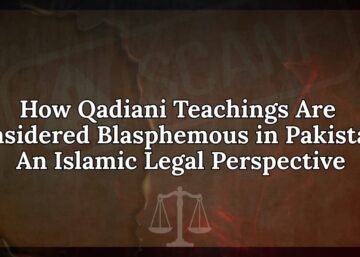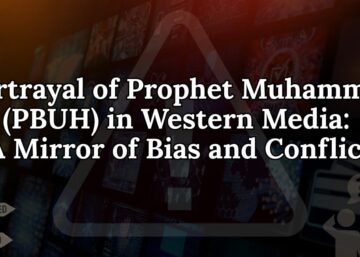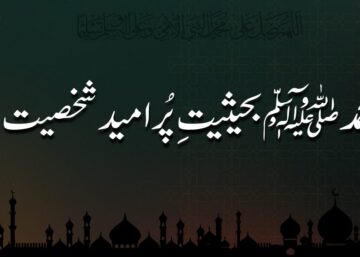As established in Islamic theology, the concept of prophethood emphasizes its divinely ordained and inherent nature. It is not a title earned or a role assumed based on personal will or development. From the moment of their spiritual creation, prophets are chosen by Allah to fulfill their mission. The Qur’an reinforces this understanding by highlighting the covenant of prophethood and the predetermined selection of prophets within specific lineages. This framework leaves no room for the possibility of a prophet first denying their prophethood or undergoing a transformation in belief before declaring their mission. By this divine law, prophethood is an unalterable truth bestowed by Allah’s will and a sacred trust upheld by every Prophet from the beginning of their existence.
Before claiming prophethood, Mirza Ghulam Ahmad of Qadian adhered to the authentic creed of Ahl al-Sunnah wa’l-Jama’ah. His beliefs aligned with those of the mainstream Muslim community, rooted in the Qur’an and Sunnah. At that time, he interpreted Khatam-un-Nabiyyin to mean “the Final Prophet” and understood Khatm-e-Nubuwwat as “the conclusion of prophethood.” For him, anyone claiming prophethood after the Prophet Muhammad (PBUH) was deemed a disbeliever, a liar, a heretic, and outside the fold of Islam.
Mirza Qadiani’s progression from indirect attributions to explicit claims of prophethood demonstrates a deliberate evolution in his narrative. Initially presenting himself as subordinate to earlier prophets, he later asserted his prophetic status as divinely conferred, supported by supposed revelations and signs. His claims remain a subject of significant theological debate and historical scrutiny within Islamic discourse.
In his early years, Mirza Qadiani’s understanding of the term Khatam is evident from the following statement, leaving no room for ambiguity:
“A twin sister named Jannat was born with me. She was delivered first, followed by me. After my birth, no other child, neither a boy nor a girl, was born to my parents. Therefore, I was their Khatam-ul-Aulad (the last child).”
(Taryaq-ul-Quloob, p. 351)
This statement clearly illustrates that, in Mirza Qadiani’s view, the word Khatam referred to “the one who comes last, after whom there is no other.”
Before claiming prophethood, Mirza Qadiani’s writings clearly acknowledge the finality of Prophet Muhammad’s (PBUH) Prophethood. His views during this period can be categorized and summarized as follows:
Acknowledgment of the Finality of Prophethood
In his earlier works, Mirza Qadiani expressed an unequivocal belief that Prophet Muhammad (PBUH) is the last Prophet, and no prophet—new or old—can come after him:
“I do not claim prophethood or departure from the Ummah, nor deny miracles, angels, or the Night of Power. I firmly believe that the Holy Prophet (PBUH) is the Seal of the Prophets, and no new or old prophet will appear after him. Moreover, not a single word of the Quran can be abrogated.”
(Nishan-e-Asmani, p. 30; Ruhani Khaza’in, vol. 4, p. 390)
Prohibition of Any Prophet After the Prophet Muhammad (PBUH)
Mirza Ghulam Ahmad also emphasized that the Quran and the Finality of Prophet Muhammad (PBUH) cannot be altered:
“No prophet can come after the Messenger of Allah (PBUH) as he is the Seal of the Prophets, nor can anyone abrogate the Quran after its completion.”
(Hamamat-ul-Bushra, p. 32; Ruhani Khaza’in, vol. 7, p. 199)
Quranic and Prophetic Confirmation of Finality
Quoting a Quranic verse and a well-known hadith, Mirza Ghulam Ahmad asserted the Finality of Prophethood:
“The Holy Prophet (PBUH) repeatedly declared that no prophet will come after me. The hadith ‘لا نَبِيَّ بَعْدِيْ’ (There is no prophet after me) was so widely accepted that no one doubted its authenticity. Similarly, the Quran explicitly states in the verse ‘وَلٰكِنْ رَسُوْلَ اللهِ وَخَاتَمَ النَّبِيِّيْنَ’ that prophethood has truly ended with our Prophet (PBUH).”
(Kitab-ul-Bariyya, pp. 99-100; Ruhani Khaza’in, vol. 17, pp. 217-218)
Explicit Statements Supporting Finality of Prophethood
In Tuhfa Golraviya, he further clarified the concept of finality in clear terms:
“The verse ‘الْيَوْمَ أَكْمَلْتُ لَكُمْ دِينَكُمْ’ (Today, I have perfected your religion for you) and ‘وَلٰكِنْ رَسُوْلَ اللهِ وَخَاتَمَ النَّبِيِّيْنَ’ (but he is the Messenger of Allah and the Seal of the Prophets) explicitly conclude prophethood with the Holy Prophet (PBUH).”
(Tuhfa Golraviya, p. 88; Ruhani Khaza’in, vol. 17, p. 174)
Rejection of the Return of Jesus (Prophet Esa (A.S))
Mirza Ghulam Ahmad strongly opposed the belief in the physical return of Jesus (as), considering it contrary to the Finality of Prophethood:
“The verse ‘مَا كَانَ مُحَمَّدٌ أَبَا أَحَدٍ مِّنْ رِجَالِكُمْ وَلٰكِنْ رَسُوْلَ اللهِ وَخَاتَمَ النَّبِيِّيْنَ’ (Muhammad is not the father of any of your men but is the Messenger of Allah and the Seal of the Prophets) clearly proves that no prophet, including Jesus, can return because prophethood has been conclusively sealed with our Prophet (PBUH).”
(Izala Auham, p. 614; Ruhani Khaza’in, vol. 3, p. 432)
Denial of New or Old Prophethood
In Ayam-us-Sulh, he emphasized that the Quran does not allow for the return of Jesus or the emergence of any prophet after Muhammad (PBUH):
“The Quran does not mention the return of Jesus, but it explicitly establishes the finality of prophethood. Neither the Quran nor hadith differentiates between old and new prophets. The hadith’ لا نَبِيَّ بَعْدِيْ’ (There is no prophet after me) categorically denies the possibility of any prophet coming after the Seal of the Prophets.”
(Ayam-us-Sulh, p. 146; Ruhani Khaza’in, vol. 14, pp. 392-393)
Public Affirmation of Belief
While addressing the congregation at the historic Jamiah Masjid Delhi, Mirza Ghulam Ahmad publicly reaffirmed his belief in the Finality of Prophethood:
“I adhere to the same creed as the majority of the Ahl-e-Sunnah wal Jama’ah. I openly declare in this sacred house of God (Jama Masjid Delhi) that I believe in the finality of Prophet Muhammad (PBUH), and I consider anyone who denies this to be outside the fold of Islam.”
(Majmua-e-Ishtiharat, vol. 1, p. 255; Tabligh-e-Risalat, vol. 2, p. 44; Asmani Faisla, p. 2; Ruhani Khaza’in, vol. 4, p. 313)
Seal of Prophethood in His Creed
In his book Haqiqat-ul-Wahi, Mirza Ghulam Ahmad restated the Finality of Prophethood as a fundamental belief:
“Allah, the Lord of the Worlds, created Adam and sent prophets and books. The final Prophet among them is Muhammad Mustafa (PBUH), who is the Seal of the Prophets and the best of messengers.”
(Haqiqat-ul-Wahi, p. 145)
The Unique Status of Prophethood: An Inherent and Preordained Attribute
Throughout the history of prophets, there has never been an instance where a prophet first denied their prophethood or held a contradictory belief before proclaiming their mission. This phenomenon is unprecedented in the annals of divine guidance. A prophet’s mission is not subject to personal deliberation or a gradual evolution of belief, as prophethood is a divine mandate bestowed from the beginning of one’s creation in the spiritual realm. The announcement of prophethood in the earthly realm is merely a formal declaration of an already-established divine reality.
The concept of prophethood is inherently incompatible with a scenario where an individual initially rejects such a calling only to claim it later after a belief change. This is because prophethood is not a title earned or developed over time but a preordained status granted by Allah. The Quran refers to this divine covenant in the following verse:
“And [recall] when Allah took the covenant of the prophets, [saying], ‘Whatever I give you of the Scripture and wisdom and then there comes to you a messenger confirming what is with you, you [must] believe in him and support him.’
[Allah] said, ‘Have you acknowledged and taken upon that My commitment?’ They said, ‘We have acknowledged it.’ He said, ‘Then bear witness, and I am with you among the witnesses.'”
(Surah Aal-Imran, 3:81)
This verse establishes that before their earthly existence, every Prophet was granted prophethood and took an oath in the spiritual realm to believe in and assist the Final Prophet, Muhammad (PBUH).
Prophethood: A Preordained and Innate Gift
The Qur’an provides ample evidence that prophethood is an inherent and preordained attribute, not an acquired skill or a result of personal spiritual attainment. Each Prophet is born with the divinely instilled capacity of prophethood, as indicated in several verses:
“We certainly sent Noah and Abraham and placed Prophethood and Scripture among their descendants.”
(Surah Al-Hadid, 57:26)
“And We gave him Isaac and Jacob and placed in his descendants Prophethood and Scripture.”
(Surah Al-Ankabut, 29:27)
These verses affirm that Allah predetermined the lineage of Noah and Abraham (Prophet Nuh and Ibrahim (A.S)) to include individuals who would be divinely chosen as prophets. This selection was made even before their physical creation, ensuring these individuals would be equipped with the qualities necessary for their prophetic mission.
Birth of a Prophet: A Continuation of Divine Will
As illustrated in the Quran, the divine appointment of prophets signifies that prophethood is not conferred upon an individual later in life but is an innate quality bestowed at the moment of their creation. For instance, when Allah declares that He has “placed prophethood” in specific lineages, it underscores the preexistence of this status.
This principle is further supported by the covenant mentioned in Surah Aal-Imran (3:81), where all prophets collectively affirmed their allegiance to the final Prophet and acknowledged their roles within the broader framework of divine guidance. Thus, when a prophet is born into this world, they are already a prophet by Allah’s decree. The formal proclamation of their mission merely marks the beginning of their active role in guiding humanity.
Mirza Ghulam Ahmad’s Approach to Prophethood and His Evolution of Claims
Mirza Ghulam Ahmad adopted a unique and gradual approach toward his claim of prophethood. Initially, he avoided using the explicit terms “prophet” or “prophethood” directly. Instead, he focused on describing the characteristics and qualities of prophethood, subtly attributing them to himself. This method led to an inevitable progression, culminating in his open declaration of prophethood in 1901 through his publication (Ek Ghalti Ka Izala).
Explicit Claims of Prophethood
Mirza Ghulam Ahmad’s writings reveal a gradual shift from implied to explicit claims of prophethood. Some notable excerpts include:
“I am both a messenger and a prophet, one sent by God and a recipient of divine revelation.”
(Ek Ghalti ka Azala, Ruhani Khazain, Vol. 18, p. 211)
“Initially, I believed that I could not compare myself to the Messiah, a prophet and among God’s most exalted servants. If any evidence of my excellence surfaced, I considered it partial and limited. However, God’s revelation later descended upon me like a torrent, and I could no longer hold that belief. I was explicitly granted the title of ‘prophet’ a prophet in one sense, but also a follower (of the Prophet Muhammad (PBUH)).”
(Haqiqat-ul-Wahi p.149, Ruhani Khazain, Vol. 22, pp. 153-154)
“I swear by the God in whose hands is my life that He has sent me, named me a prophet, and called me the Promised Messiah.”
(Haqiqat-ul-Wahi, p. 68, Rabwah Edition, 1950)
“I swear by the God in whose hands is my life that He has sent me, named me a prophet, and declared me the Promised Messiah, manifesting many signs in my support, amounting to as many as three hundred thousand.”
(Haqiqat-ul-Wahi p. 68, Ruhani Khazain, Vol. 22, p. 503)
Final Declaration of Prophethood by Mirza Qadiani
Towards the latter part of his life, Mirza Ghulam Ahmad went a step further in his claims, asserting his prophethood and a unique position of finality within it. He emphasized that his status was singular, exclusive, and divinely ordained. Below are some of his notable writings that illustrate this final declaration of prophethood:
Mirza Ghulam Ahmad’s Writings on His Exclusive Prophethood
“For this reason, I have been designated a prophet in this Ummah. No other individual is entitled to this name. This was necessary to fulfill the prophecy in authentic hadiths that foretold the coming of one individual who would embody this role.”
(Haqiqat-ul-Wahi p.391, Ruhani Khazain, Vol. 22, pp. 406-407)
“Those who rejected an exalted messenger of God have perished. Blessed are those who recognized me. I am the final path among all of God’s paths and the ultimate light among all His lights. Wretched is the one who turns away from me, for without me, all is darkness.”
(Kashti-e-Nuh p.56, Ruhani Khazain, Vol. 19, p. 61)
Contradictions and Shifting Positions
Mirza Ghulam Ahmad’s writings reveal a pattern of evolving claims, which often contradicted his earlier statements. Initially, he denied any claim to prophethood, presenting himself as a reformer (Mujaddid). However, later, he adopted the title of a prophet, even asserting a unique form of “finality” within his prophethood. This progression led to significant internal contradictions in his claims:
Early Denial of Prophethood
In his earlier works, Mirza Ghulam Ahmad categorically denied claiming prophethood. He positioned himself as a servant of the Prophet Muhammad (PBUH) and a reformer for the Muslim community.
Later Assertion of Prophethood
In contrast, his later writings reveal explicit claims of being divinely appointed as a prophet, with a unique role as the “final light” for the world.
Confusion Among Followers
The inconsistency in Mirza Ghulam Ahmad’s claims created significant confusion among his followers. Even a century after his death, his community remains divided on whether to regard him as merely a reformer (Mujaddid) or fully accept his claim to prophethood. This ambiguity has led to the formation of two major factions within the Ahmadiyya movement:
The Lahore Ahmadiyya Movement
This faction emphasizes Mirza Ghulam Ahmad’s earlier stance, considering him only a reformer and denying his claim to prophethood.
The Qadiani Ahmadiyya Movement
This group accepts his later claims and regards him as a prophet in a subordinate sense, believing that his prophethood aligns with the finality of Prophet Muhammad (PBUH).
Mirza Ghulam Ahmad’s evolving claims reflect a journey influenced by personal interpretations and external pressures. While his early denial of prophethood may have been an attempt to align with mainstream Islamic beliefs, his later assertions of unique prophethood placed him at odds with the doctrine of Khatm-e-Nabuwwat (Finality of Prophethood).
Ultimately, his claims represent a departure from Islamic orthodoxy, leading to a legacy of division, controversy, and ongoing theological debates. His later works contradicted his earlier writings and cast doubt on his consistency, leaving his followers struggling to reconcile his contradictory positions. His ultimate assertion of being the final “light” of divine guidance is a stark challenge to the Islamic concept of Prophet Muhammad (PBUH) as the Seal of the Prophets.



